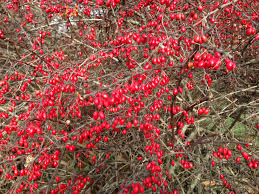
Daruharidra is a spiny evergreen shrub that grows up to 3.5 m tall and thrives at 1000–3500m above sea level in the Himalayas and Nilgiris. Daruharidra means tree turmeric. It is a good remedy for regulating the liver and clearing the toxins from the body.
Benefits of Daruharidra: Nausea, thirst, arthritis, jaundice, fever, skin diseases, malaria, sores, liver and spleen diseases, scarlet fever, brain disorders, diabetes, reduces blood pressure, renal calculi.
Action: Diuretic, antibilious, refrigerant, stomachic, bitter tonic, antiperiodic, alterative, antipyretic
Scientific name: Berberis aristata.
Useful part: Berries.
Dosage: 1–6 g per day or 3–9 ml per day.
Energetics
Rasa (taste): Bitter, astringent
Vırya(energy): Hot
Vipaka (post-digestive effect): Pungent
Guna (quality): Light, dry
Dosa effect: KP−, V+ in excess
Dhatu(tissue): Plasma, blood, fat
Srotas (channel): Excretory, circulatory, digestive
Classical and common names
Ayurvedic: Daaruharidraa, Pitadaaru, Pitatvaka, Hemkaanta, Daarvi, Daarunishaa, Parjanyaa, Parjani, Pita Kaaliyak, Katamkateri, Pachampachaa.
English: Indian Barberry.